The Sevillian Chronicles: Weekly Reports from al-Andalus
- Thread starter unmerged(92549)
- Start date
-
We have updated our Community Code of Conduct. Please read through the new rules for the forum that are an integral part of Paradox Interactive’s User Agreement.
You are using an out of date browser. It may not display this or other websites correctly.
You should upgrade or use an alternative browser.
You should upgrade or use an alternative browser.
This is great! Good luck and I will definitely be following!
Thanks!
Blame the Christians!
Always works.
Well, they do believe that the son of God was a zombie...
Never hurts to own the rich cities of Southern Spain.
Yeah, southern Spain is pretty rich. Too bad in OTL that's the only thing the taifas had going for them; their military really was pretty pitiful.
Interesting stuff, I'll be reading.
Thank you for your patronage, sir.
Word!
Glad you liked it. It felt appropriate.
The Jewish general is awesome beyond words.
Now I want to start a game as a taifa!
Isaac actually switched back and forth between being my marshal and steward and he even had a few kids, so you haven't seen the last of him or the ibn Abalias.
All looking good so far. I like to see this kind of AAR, with clear alternate history and clear goals. I'm looking forward to seeing the islamic conquista in action.
Oh, wow, the Emir is certainly willing to pull off some underhanded tricks. Nicely done all around!
All looking good so far. I like to see this kind of AAR, with clear alternate history and clear goals. I'm looking forward to seeing the islamic conquista in action.
I'm glad that's what you're getting out of it, that's what I was going for.
Oh, wow, the Emir is certainly willing to pull off some underhanded tricks. Nicely done all around!
You can't make an omelet without breaking a few eggs.
Emir Abbad II al-Mu'tadid ibn Abbad
With Almeria secured for the emirate, Abbad II and his troops returned to Seville to wait for the inevitable Galician attack. In early July, Galician ships were spotted of the coast of Harun. Harun’s sheik sent word to Seville and withdrew his troops into the city’s walls to wait for support. The sheik’s messenger rode hard and covered the 198 km distance in just over four hours. Abbad II reacted quickly; he gathered his troops and sent his swiftest riders to the surrounding sheikdoms with orders for them to mobilize their troops and to rally with his troops just out side the city.
When Abbad II marched to the outskirts of Harun the next day he had nearly three thousand troops with him, more than enough to repel the small two thousand man force under King Garcia II. But, unknown to the emir, the night before Garcia II had bribed the sheik of Silves to abandon Abbad’s right wing. When the Sevillian army engaged its Galician counterpart, the sheik of Silves abandoned the right wing, marching away with nearly a third of Abbad II’s troops, leaving the Sevillian army in a bad position. Abbad II quickly sent out orders to shift men from the left and center to fill the gap, but it was no use; Garcia II had been waiting for the sheik of Silves to abandon the right wing and was quick to pour troops into the hole. Abbad II ordered troops from the center and left wing to fill in the hole, but by then it was too late. Sensing that the only way to salvage his army was to pull back, Abbad II ordered a retreat.
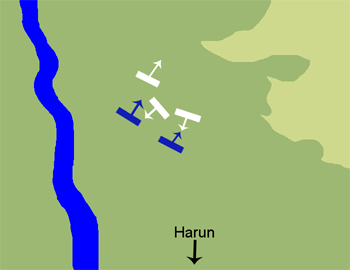
The Battle of Formosa. Each line represents 1000 men. Here the sheik of Silves abandons the right wing, forcing Abbad II to scramble to fill in the gap.
Meanwhile, the sheik of Harun had not been doing nothing. When Garcia had went to engage the Sevillian army he’d only left a token force to besiege the city; he’d incorrectly assumed that the forces commanded by the sheik only numbered in the hundreds. In reality, the sheik had nearly two thousand men under his command and had been waiting for a chance to break out of the city. He got his chance when Garcia marched off to fight Abbad II. The sheik quickly defeated the besieging force and marched off to find Garcia and defeat him. He arrived just as the Sevillian army was in full retreat. He ordered his horsemen to charge at the Galicians’ flanks while he ordered his infantry into a quick march.
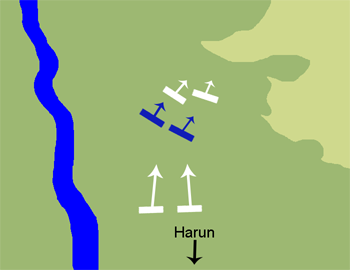
The sheik of Harun’s troops arrive just as Abbad II’s troops retreat.
The result was disastrous for the Galician army. King Garcia II was one of the first to fall to the surprise attack and the Galician army routed soon after. The routing army ran into the slowly reforming Sevillian army. Things became even worse when the sheik’s army joined the already confused fray; since the soldiers could not immediately tell the difference between the two bloody groups already fighting the killed anyone who did not quickly identify themselves. Eventually, the various elements of the Galician army were either dead, dying, or had surrendered, allowing emirate to count it as a victory.
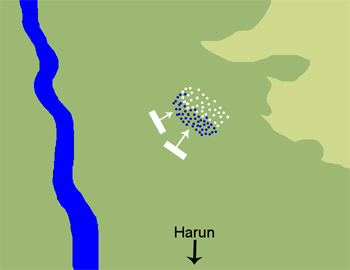
The Battle of Formosa comes to an end with the death of King Garcia II.
The Battle of the Formosa, as it would later be called, would‘ve gone down in history as nothing more than a hilarious footnote had it not been for one important fact: Abbad II had struck by a wayward sword and fallen off his horse. The emir slipped into a coma and his wounds soon festered, but Abbad II would linger until 20 March 1082, before finally passing away. The streets of Seville were filled with mourners for three days and all of Seville seemed to be under a dark cloud.
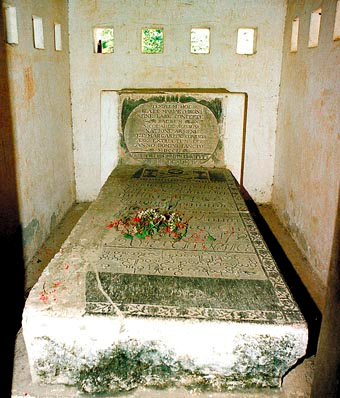
The final resting place of Emir Abbad II al-Mu'tadid ibn Abbad.
With Almeria secured for the emirate, Abbad II and his troops returned to Seville to wait for the inevitable Galician attack. In early July, Galician ships were spotted of the coast of Harun. Harun’s sheik sent word to Seville and withdrew his troops into the city’s walls to wait for support. The sheik’s messenger rode hard and covered the 198 km distance in just over four hours. Abbad II reacted quickly; he gathered his troops and sent his swiftest riders to the surrounding sheikdoms with orders for them to mobilize their troops and to rally with his troops just out side the city.
When Abbad II marched to the outskirts of Harun the next day he had nearly three thousand troops with him, more than enough to repel the small two thousand man force under King Garcia II. But, unknown to the emir, the night before Garcia II had bribed the sheik of Silves to abandon Abbad’s right wing. When the Sevillian army engaged its Galician counterpart, the sheik of Silves abandoned the right wing, marching away with nearly a third of Abbad II’s troops, leaving the Sevillian army in a bad position. Abbad II quickly sent out orders to shift men from the left and center to fill the gap, but it was no use; Garcia II had been waiting for the sheik of Silves to abandon the right wing and was quick to pour troops into the hole. Abbad II ordered troops from the center and left wing to fill in the hole, but by then it was too late. Sensing that the only way to salvage his army was to pull back, Abbad II ordered a retreat.

The Battle of Formosa. Each line represents 1000 men. Here the sheik of Silves abandons the right wing, forcing Abbad II to scramble to fill in the gap.
Meanwhile, the sheik of Harun had not been doing nothing. When Garcia had went to engage the Sevillian army he’d only left a token force to besiege the city; he’d incorrectly assumed that the forces commanded by the sheik only numbered in the hundreds. In reality, the sheik had nearly two thousand men under his command and had been waiting for a chance to break out of the city. He got his chance when Garcia marched off to fight Abbad II. The sheik quickly defeated the besieging force and marched off to find Garcia and defeat him. He arrived just as the Sevillian army was in full retreat. He ordered his horsemen to charge at the Galicians’ flanks while he ordered his infantry into a quick march.

The sheik of Harun’s troops arrive just as Abbad II’s troops retreat.
The result was disastrous for the Galician army. King Garcia II was one of the first to fall to the surprise attack and the Galician army routed soon after. The routing army ran into the slowly reforming Sevillian army. Things became even worse when the sheik’s army joined the already confused fray; since the soldiers could not immediately tell the difference between the two bloody groups already fighting the killed anyone who did not quickly identify themselves. Eventually, the various elements of the Galician army were either dead, dying, or had surrendered, allowing emirate to count it as a victory.

The Battle of Formosa comes to an end with the death of King Garcia II.
The Battle of the Formosa, as it would later be called, would‘ve gone down in history as nothing more than a hilarious footnote had it not been for one important fact: Abbad II had struck by a wayward sword and fallen off his horse. The emir slipped into a coma and his wounds soon festered, but Abbad II would linger until 20 March 1082, before finally passing away. The streets of Seville were filled with mourners for three days and all of Seville seemed to be under a dark cloud.

The final resting place of Emir Abbad II al-Mu'tadid ibn Abbad.
So one of your regiments decided to leave the battlefield without any reason?
So normal in CK.
So normal in CK.
An inglorious death to a promising ruler. Hope the next in line can call himself Caliph in the future  .
.
I see you have about as much luck with your rulers and battles as I had.
I wish I had your luck. Since DVIP's Addon has some events that effect certain body parts the whole battle was pretty much: Abbad II suffers a groin injury (minus fertility), Abbad II falls off his horse (minus some health), Abbad II gets hit in the head (gains the "stutter" trait), Abbad II breaks an arm (injury). Oh, and he got the "Character shows cowardice" event not once, but twice.
After the battle was probably worse: Old Wound Festers (gets illness), Illness Worsens (gets TB), Old Wound Festers (gets illness), Illness Becomes Worms (gets stomach worms), Old Wound Festers (gets illness), becomes depressed, then becomes suicidal.
I think it's safe to say CK wanted Abbad II dead.
So one of your regiments decided to leave the battlefield without any reason?
So normal in CK.
Yeah, I got the "Treason in the Air!" event and lost nearly half my army. I had to mobilize some more troops.
An inglorious death to a promising ruler. Hope the next in line can call himself Caliph in the future.
I had high hopes for Abbad II. As always, CK ruined them.
Classic CK, makes for great story telling though!
Yep, never a dull moment in CK, whether it be civil wars started by a count or your current character being an inbred idiot.
Great read, keep up the good work! It seems like you don't see many Muslim AARs.
Thank you. The reason you really don't see too many Muslim AARs is that they aren't included upon start up unless you mod them in and even then you've got to mod the save file every time to include your chosen country. It's a pretty big pain, unless you can find the latest Muslim/Pagan mod for CK. There's a link to the newest one on the first page, if you want to play as a Muslim/Pagan nation.
Emir Muhammad I al-Mutamid ibn Abbad
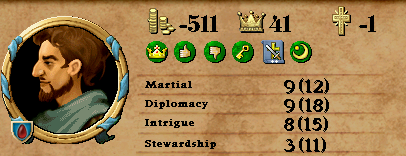
When Muhammad I became Emir of Seville, it was with years of experience in the running of the emirate; Muhammad had served as the emirate's marshal and, when Abbad II fell into a coma after the Battle of Formosa, he and a small council of trusted nobles ruled in Abbad II's place until his death.
Upon his ascent to the throne, Muhammad I immediately replaced his father's Grad Vizier, Isaac ibn Abalia, with his lover the poet Ibn Ammar. Ammar proved himself to not just be a literary genius, but also a diplomatic one when he negotiated an alliance between Seville and Almoravids of the Magreb, creating a solid, southern Islamic power bloc that rivaled the Castille-León alliance that had been created in the wake of the defeat of Galicia at Formosa.
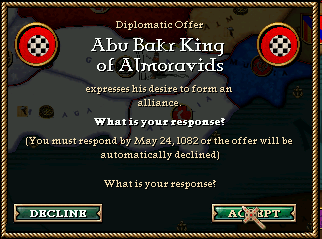
Ammar proved himself worthy of the position of Grand Vizier by negotiating an alliance with the Almoravids.
For ten years the emirate was peaceful and the gold flowed freely; Muhammad I had paid off the government's loans, only to take out another, larger loan. This new loan would help pay for new workshops, glassworks, and schools. This stability was shattered when, in 1095, the Bishop of Rome called for all good Christian rulers to join together in a holy war to retake the city of Tunis. The First Crusade had begun.
Several events are seen as the cause of the First Crusade; perhaps the biggest one was the Roman Curia choosing the hot-headed and zealous Pope Michael I instead of Bishop Otho de Lagery, who was considered the more level headed of the two. Some historians have gone so far as to say that, had Michael I not been elected and instead Bishop Otho had, then there may never have been any Crusades, avoiding several hundred years of hate and bloodshed.
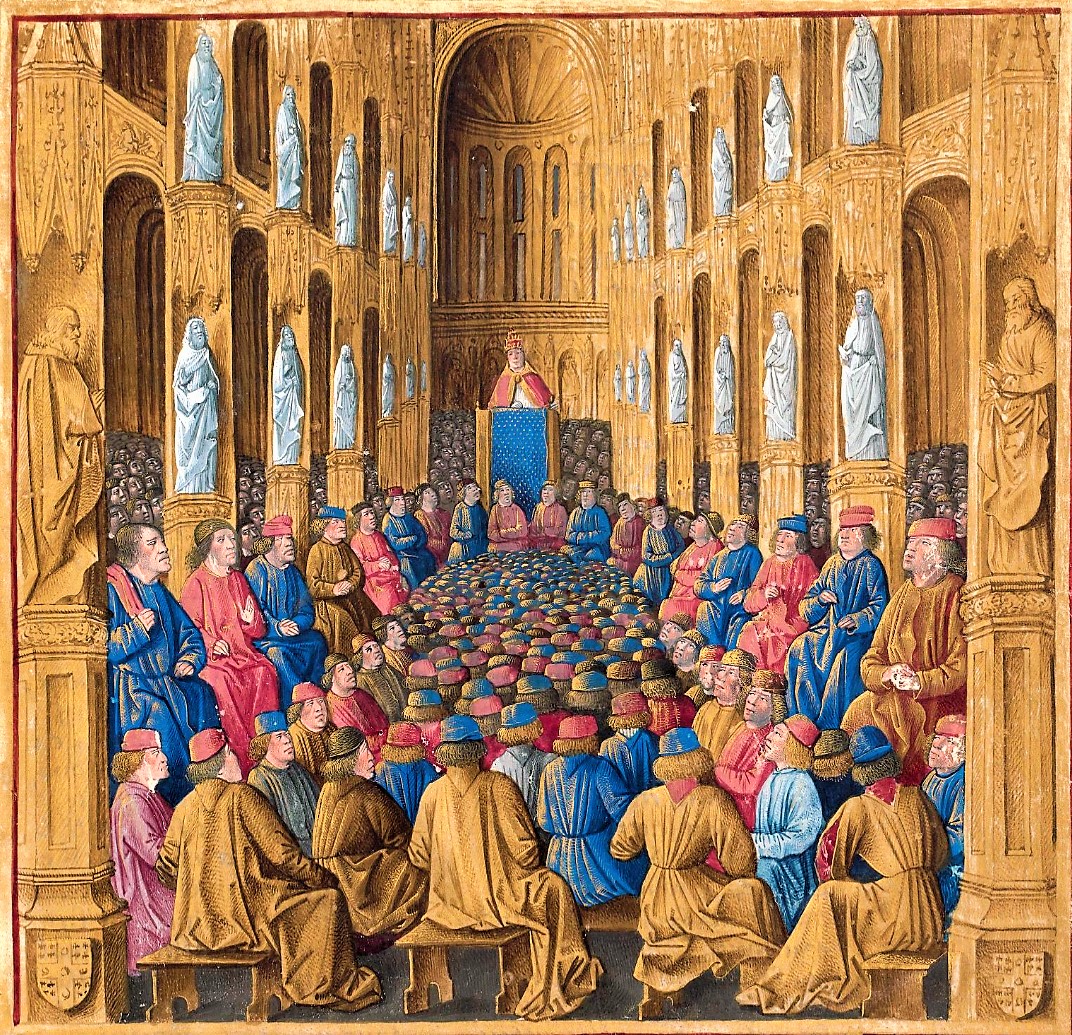
The Council of Cava de' Tirreni
While touring in the Kingdom of Sicily, Michael I held a council at the small town of Cava de' Tirreni. At attendance at the council was King Roger I d'Hauteville, who pleaded with his distant relative to provide him with aid against the Zirids. Over a span of twenty years, Roger I had fought several wars against the Zirids with mixed results. Currently, the Zirids had occupied the island of Sicily and were preparing to invade Calabria. Michael I, who was worried what would happen should Roger I fail to stave off the Zirids agreed to make a speech in front of the assembled clergy and nobles. The chronicler Fulcher of Chartres perhaps has the best record of Pope Michael I's first speech to the assembled clergy and nobility at Cava de' Tirreni.
Let those who have been accustomed unjustly to wage private warfare against the faithful now go against the infidels and end with victory this war which should have been begun long ago. Let those who for a long time, h[ave been robbers, now become knights. Let those who have been fighting against their brothers and relatives now fight in a proper way against the barbarians. Let those who have been serving as mercenaries for small pay now obtain the eternal reward. Let those who have been wearing themselves out in both body and soul now work for a double honor.
Apparently not happy with this, King Roger I confronted Michael I and demanded that he use stronger words and emphasize that their Christian brothers suffered under the Zirid's yoke. Michael I consented and two days later he gave the famous "Vile Race"[1] speech. Again, Fulcher of Chartres is the best source:
Freshly quickened by the divine correction, you must apply the strength of your righteousness to another matter which concerns you as well as God. For your brethren who live in the south are in urgent need of your help, and you must hasten to give them the aid which has often been promised them. For, as the most of you have heard, the Moors and Arabs have attacked them and have conquered the territory of Sicily and prepare to invade Calabria. They have occupied more and more of the lands of those Christians, and have overcome them in seven battles. They have killed and captured many, and have destroyed the churches and devastated the kingdom. If you permit them to continue thus for awhile with impurity, the faithful of God will be much more widely attacked by them. On this account I, or rather the Lord, beseech you as Christ's heralds to publish this everywhere and to persuade all people of whatever rank, foot-soldiers and knights, poor and rich, to carry aid promptly to those Christians and to destroy that vile race from the lands of our friends.
News of Michael's speech slowly spread throughout Europe and most Christian rulers responded by either sending money or small numbers of knights to aid Roger I. But several kings decided to take a more direct approach and soon the Holy Roman Empire and Wales had joined Sicily in their war against the Zirids. Here Guibert of Nogent's Deeds of God through the Welsh and Germans provides the best record of Welsh and German involvement in the First Crusade as well as providing an invaluable chronicle of the rise of the House of Stolzenberg as the kings of Carthage.
When news of Michael's speech reached Seville, Emir Muhammad I showed little concern; pirates funded by the Zirids had been disrupting Sevillian merchants and Muhammad I was only too happy to watch their situation become worse. Unfortunately, Muhammad I wouldn't have time to enjoy watching his foes squirm; perhaps sensing the moment was right the king of Castille declared war on Seville with the intent of ridding the peninsula of the strongest Muslim power. The king of León, surprisingly, declined to participate in his brother's war.
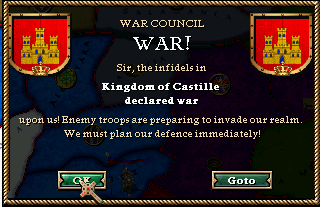
The king of Castille contributation to the "holy war."
-----------
[1] So called because of the last line of the speech.

When Muhammad I became Emir of Seville, it was with years of experience in the running of the emirate; Muhammad had served as the emirate's marshal and, when Abbad II fell into a coma after the Battle of Formosa, he and a small council of trusted nobles ruled in Abbad II's place until his death.
Upon his ascent to the throne, Muhammad I immediately replaced his father's Grad Vizier, Isaac ibn Abalia, with his lover the poet Ibn Ammar. Ammar proved himself to not just be a literary genius, but also a diplomatic one when he negotiated an alliance between Seville and Almoravids of the Magreb, creating a solid, southern Islamic power bloc that rivaled the Castille-León alliance that had been created in the wake of the defeat of Galicia at Formosa.

Ammar proved himself worthy of the position of Grand Vizier by negotiating an alliance with the Almoravids.
For ten years the emirate was peaceful and the gold flowed freely; Muhammad I had paid off the government's loans, only to take out another, larger loan. This new loan would help pay for new workshops, glassworks, and schools. This stability was shattered when, in 1095, the Bishop of Rome called for all good Christian rulers to join together in a holy war to retake the city of Tunis. The First Crusade had begun.
Several events are seen as the cause of the First Crusade; perhaps the biggest one was the Roman Curia choosing the hot-headed and zealous Pope Michael I instead of Bishop Otho de Lagery, who was considered the more level headed of the two. Some historians have gone so far as to say that, had Michael I not been elected and instead Bishop Otho had, then there may never have been any Crusades, avoiding several hundred years of hate and bloodshed.

The Council of Cava de' Tirreni
While touring in the Kingdom of Sicily, Michael I held a council at the small town of Cava de' Tirreni. At attendance at the council was King Roger I d'Hauteville, who pleaded with his distant relative to provide him with aid against the Zirids. Over a span of twenty years, Roger I had fought several wars against the Zirids with mixed results. Currently, the Zirids had occupied the island of Sicily and were preparing to invade Calabria. Michael I, who was worried what would happen should Roger I fail to stave off the Zirids agreed to make a speech in front of the assembled clergy and nobles. The chronicler Fulcher of Chartres perhaps has the best record of Pope Michael I's first speech to the assembled clergy and nobility at Cava de' Tirreni.
Let those who have been accustomed unjustly to wage private warfare against the faithful now go against the infidels and end with victory this war which should have been begun long ago. Let those who for a long time, h[ave been robbers, now become knights. Let those who have been fighting against their brothers and relatives now fight in a proper way against the barbarians. Let those who have been serving as mercenaries for small pay now obtain the eternal reward. Let those who have been wearing themselves out in both body and soul now work for a double honor.
Apparently not happy with this, King Roger I confronted Michael I and demanded that he use stronger words and emphasize that their Christian brothers suffered under the Zirid's yoke. Michael I consented and two days later he gave the famous "Vile Race"[1] speech. Again, Fulcher of Chartres is the best source:
Freshly quickened by the divine correction, you must apply the strength of your righteousness to another matter which concerns you as well as God. For your brethren who live in the south are in urgent need of your help, and you must hasten to give them the aid which has often been promised them. For, as the most of you have heard, the Moors and Arabs have attacked them and have conquered the territory of Sicily and prepare to invade Calabria. They have occupied more and more of the lands of those Christians, and have overcome them in seven battles. They have killed and captured many, and have destroyed the churches and devastated the kingdom. If you permit them to continue thus for awhile with impurity, the faithful of God will be much more widely attacked by them. On this account I, or rather the Lord, beseech you as Christ's heralds to publish this everywhere and to persuade all people of whatever rank, foot-soldiers and knights, poor and rich, to carry aid promptly to those Christians and to destroy that vile race from the lands of our friends.
News of Michael's speech slowly spread throughout Europe and most Christian rulers responded by either sending money or small numbers of knights to aid Roger I. But several kings decided to take a more direct approach and soon the Holy Roman Empire and Wales had joined Sicily in their war against the Zirids. Here Guibert of Nogent's Deeds of God through the Welsh and Germans provides the best record of Welsh and German involvement in the First Crusade as well as providing an invaluable chronicle of the rise of the House of Stolzenberg as the kings of Carthage.
When news of Michael's speech reached Seville, Emir Muhammad I showed little concern; pirates funded by the Zirids had been disrupting Sevillian merchants and Muhammad I was only too happy to watch their situation become worse. Unfortunately, Muhammad I wouldn't have time to enjoy watching his foes squirm; perhaps sensing the moment was right the king of Castille declared war on Seville with the intent of ridding the peninsula of the strongest Muslim power. The king of León, surprisingly, declined to participate in his brother's war.

The king of Castille contributation to the "holy war."
-----------
[1] So called because of the last line of the speech.
Last edited:
I suppose your alliance with the Almoravids took effect? I don't think those Castillans stand a chance. 
Showdown!Crush the infidel!
Will Isaac ibn Abalia return?
Yes, Isaac will be making a return in the next update.
I suppose your alliance with the Almoravids took effect? I don't think those Castillans stand a chance.
Yeah, my alliance took effect; the Almoravids are a pretty average power but they ended up playing a major role against the Castillans.
*Sevilla used Countercrusade*
*It's super effective!*
Was that a Pokémon reference? If so, I like it!

